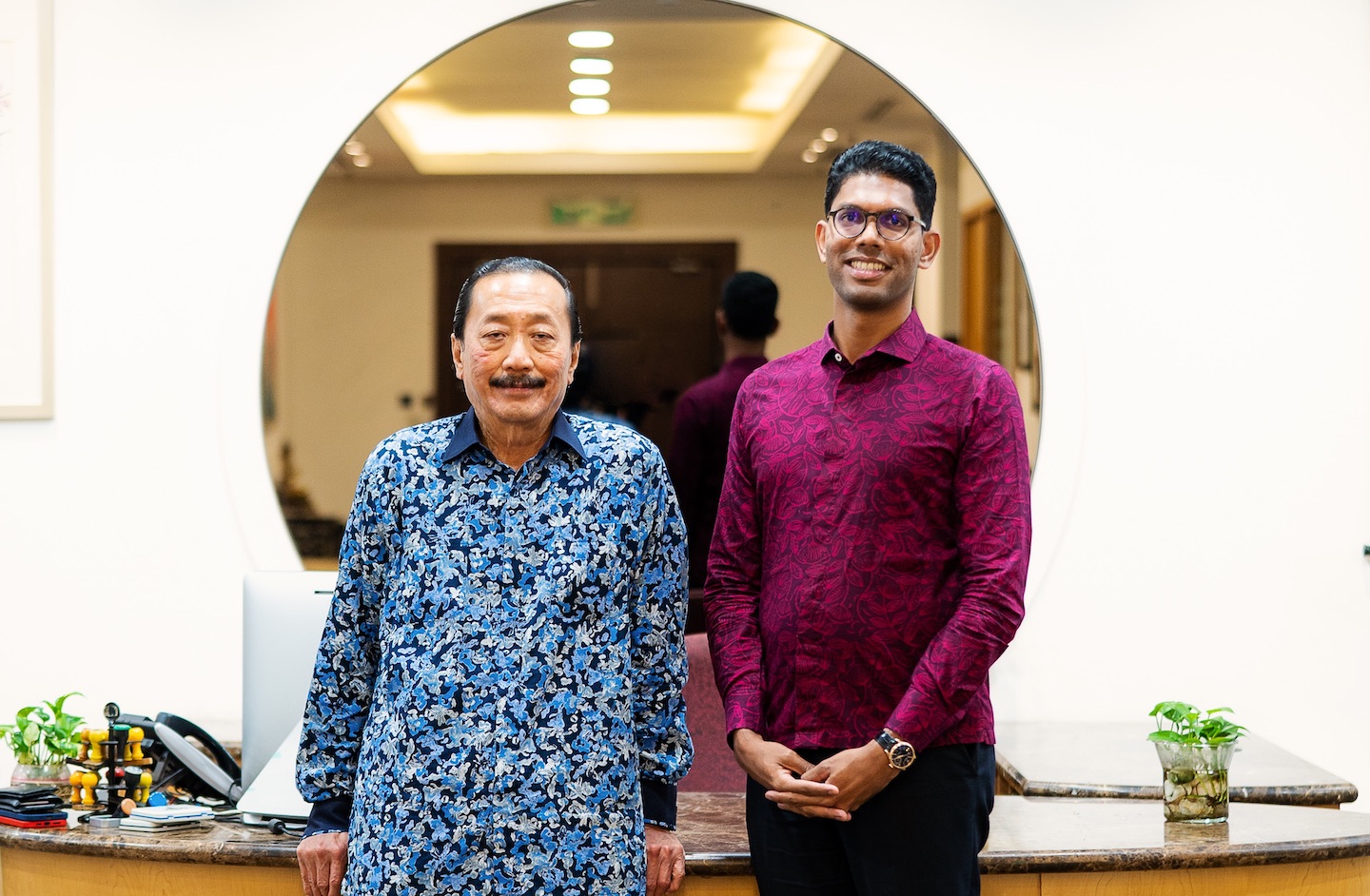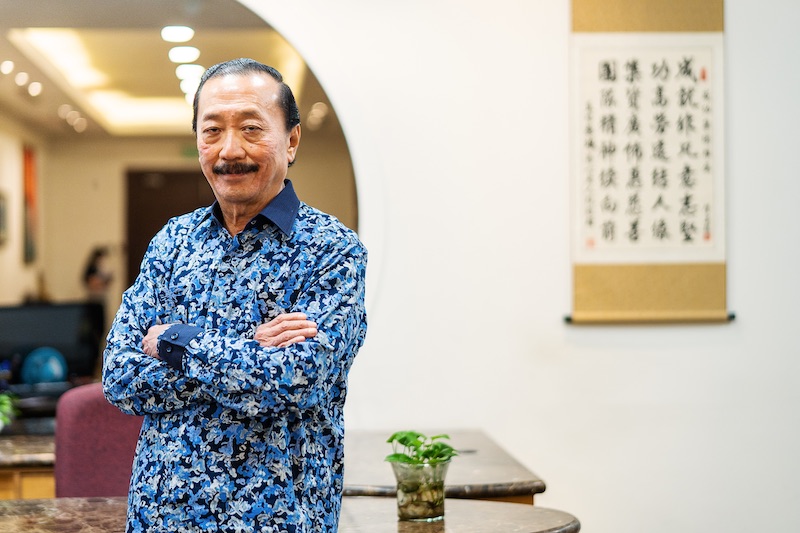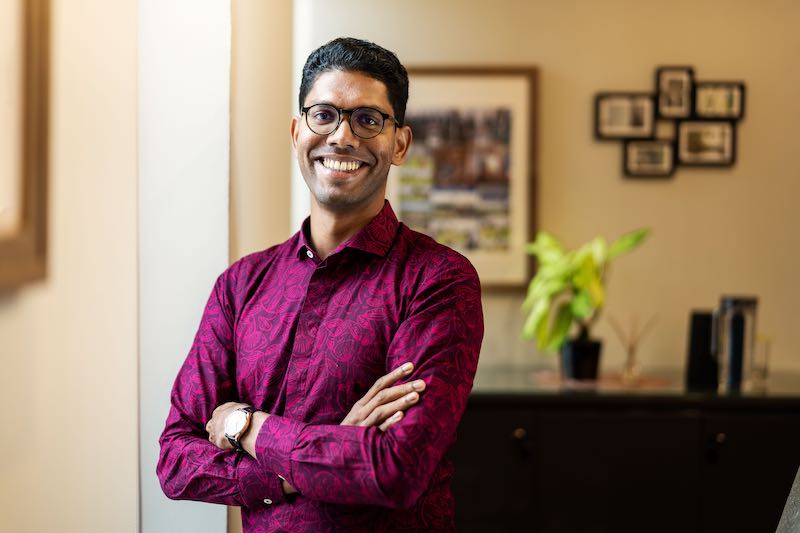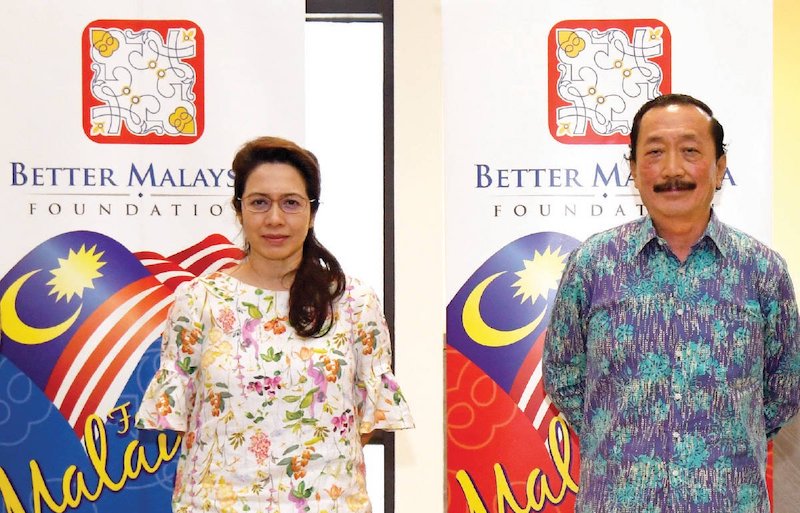
It was football that brought Berjaya Corp founder Tan Sri Vincent Tan and group CEO Jalil Rasheed together (Photo: Paulius Staniunas/All is Amazing
At first glance, it seems as if there is little to nothing in common between Tan Sri Vincent Tan, the founder and chairman of Berjaya Corporation Bhd (BCorp), and his youthful, recently appointed group CEO Jalil Rasheed, besides a penchant for wearing batik shirts — which the latter encouraged as official work attire when he came on board.
Delve a little deeper though, and it soon becomes clear how their similarities outweigh their differences. In fact, it was a shared love of the beautiful game that first brought the young Turk, fresh from his short stint as CEO of state investment fund Permodalan Nasional Bhd, into Tan’s airtight circle. “I was chatting with Jalil over football and was impressed with the way he spent his free time analysing how revenue and profits are made by football clubs,” says Tan. “I was also impressed with the sound advice he gave about what could and should be done to streamline BCorp, improve corporate governance and enhance shareholder value. Most importantly, we share the same values in life. A skilled fund manager, Jalil displays principles and integrity of the highest order, knows investor sentiments and is a clear, strategic thinker.”
Both share the same floor of Berjaya Times Square’s East Wing, in Kuala Lumpur. The space is filled with both personal and professional memorabilia — a framed picture of former prime minister Tun Dr Mahathir Mohamad and wife Tun Dr Siti Hasmah Ali (Tan never fails to throw his close friend a birthday party annually), a treasured portrait of Tan’s beloved mother, Madam Low Siew Beng, who still lives together with him in the family home, assorted Chinese paintings, several photos of Tan scuba diving, and assorted corporate bric-a-brac.
“I’ve been diving since 1985 when I first bought into Tioman, although I am a more experienced diver versus expert diver,” Tan says good-naturedly, referring to the Berjaya Tioman Resort BCorp owns on the east coast of Malaysia.
Jalil’s corporate domain, by comparison, seems austere. There are just two big screens on the desk, including one for Bloomberg, a reed diffuser and — for those who know his football club leanings — a Jürgen Klopp mouse pad (he has supported Liverpool FC since he was seven, when Kenny Dalglish was still manager).
Green-letter day
Those who do not know Tan would perceive him as stern; intimidating even. But he has a Zen side, a spiritual side — one that is nurtured by his reverence for Master Cheng Yen, the petite Taiwanese nun and founder of the international and highly regarded Buddhist humanitarian organisation, Tzu Chi Foundation.
“I got to know Tzu Chi through Berjaya Founder’s Day [activities],” Tan explains. “They do great charity work and have many dedicated volunteers and offices in 80 countries. I visited [the organisation] in April 2015, spending three days in Taiwan. Everything is vegetarian there and I met the Master during one session. It was then she suggested that becoming vegetarian would be good for me. I later learnt Master built the international organisation without ever leaving Taiwan. I was truly impressed.”
vincent_tan.jpg

It was upon returning to Malaysia that Tan thought about trying out vegetarianism. “I measured the health and spiritual benefits, and the knowledge [that] animals [don’t] have to die for us, and it was a good thought.” When asked if he found it difficult to give up meat initially, he snaps: “Once you decide something is possible, you can do it; you just need discipline. Me, I had no problem. I am easy to discipline when it comes to food ... But not other things though,” he laughs. “I am not a person who craves expensive food … I don’t need Michelin stars. I don’t drink, not even beer. I don’t enjoy [drinking], particularly after seeing the damage liquor can do.”
Having gone green for 6½ years now, Tan is slowly wielding his influence to get others to see the benefits of meat and dairy alternatives. BCorp is the exclusive distributor of the Beyond Meat plant-based range of meat alternatives. Last year was particularly fruitful for the group, with its acquisition of plant-based restaurants, including Tex-Mex vegan chain Sala (its name is an acronym for salvar a los animales or “save the animals” in Spanish), and Simply Good Food. Tan has also transformed the former Big Apple restaurant in Berjaya Times Square — a favourite among employees — into a vegetarian one, now renamed Berjaya Cafe. “Much to the management’s objection,” he chuckles. “But I am a strong believer in the health benefits of eating vegetables and fruits. I’m not vegan — yet — but maybe soon.”
Back to the BCorp agenda, however, Tan muses: “I have run the company as an entrepreneur all these years. The challenges brought about by the pandemic have been tough. My vision is for the various businesses within the group to be streamlined and transformed into a high-performing institutionalised organisation managed by a professional.”
Bullish on BCorp
Assuming the position of group CEO of BCorp earlier this year, Jalil made history of sorts as the first non-family member appointed to lead the company, which generates about US$5 billion (RM21 billion) in revenue and has over 8,000 employees globally. He comes well-prepared though, bringing with him close to 20 years' experience and senior roles in Europe and Asia. Market sentiment was positive when news of his appointment broke, leading to a share price surge.
Still, starting a new job in the middle of a pandemic is a unique position to be in, let alone that of group CEO, but it is one that Jalil relishes — challenges included. “I must have used every video conferencing app around already. I am tech-savvy … or at least I like to think so, but am definitely not as good as my nine-year-old. But forming relationships is not possible over Zoom … and which can seem rather transactional after a while. I stress about that. Now, I spend a lot of time on the ground, visiting our assets and going around saying, ‘Thank you for holding the fort all these months.’”
Tall and lanky, Jalil cuts a bright swathe through the BCorp fabric. Besides the fuchsia batik print he is wearing today and equally bright Happy Socks, his leadership style is open, direct and engaging. “From Day One, I told [the team] I am not here to tell you how to do your job,” he says. “I am here to set strategic direction. That is the only way to run a group as diversified as this.”
jalil.jpg

On his penchant for batik, he muses: “I started wearing batik while working in Indonesia and discovered I loved it. Then, when I moved to Singapore, I continued wearing it. Slowly, slowly, I ditched the suit and it is almost 10 years now. Today, I own over 40 different batik shirts and make it a point to buy batik only from Kelantan and Terengganu, which I then get tailored.” On the bold sartorial move, he notes: “People adapted [wearing batik]. It was never forced. In fact, it was the younger ones who were quick to take it up. Batik looks smart but is more casual than a suit. People are enjoying slowly losing the ties and jackets, rolling up their sleeves while they are at it as well.”
Tan, meanwhile, spills the beans on what actually triggered the batik discussion. “We were in Terengganu to greet a VVIP and were told we could not enter the VIP waiting room as we were wearing batik, and not suits. We then had to wait at the jetty, watching everyone else around sweltering in their hot, western-style get-ups. We were indignant! How can we be in Terengganu, the heart and home of batik in Malaysia, and not be allowed to wear it proudly?”
To industry-watchers, it would appear Jalil’s entrance came at an opportune time. The pandemic had ravaged businesses globally and BCorp, whose interests run the gamut from property development to general insurance, food and beverage and hospitality, did not emerge unscathed. Jalil says his immediate mandate is to future-proof the group for more potential shocks. “We were exposed,” he admits.
Still, in the time he has spent as group CEO, Jalil says it was “exhilarating” despite half of it being under lockdown. “It was challenging,” he admits. “Personally, I realised I am a very social animal — not one to be kept at home. On the bright side, we sped up our digitalisation much quicker. So, now the group is trying to embrace digitalisation without losing agility. What we need to remember is that the most important software is the human aspect. A quick update meeting is fine over Zoom but for certain meetings, it is a balancing act. Now, it’s all about looking back at what worked, what didn’t, and bringing it together in a balancing act.”
It is also clear that digitally savvy Jalil walks the talk. A quick scroll through his social media (@jalil.word on Instagram) shows a dynamic young leader who isn’t holed up in his C-suite but relishes the act of turun padang, doing regular site visits of the group’s many businesses, from the Starbucks Reserve at Tropicana Gardens to Bandar Rimbayu where most of its food business brands, including the country’s first Krispy Kreme Doughnuts drive-through, can be found in a single location.
For a better Malaysia
While Jalil is hard at work restructuring, future-proofing and streamlining, Tan is freed up to focus on his pet project — the Better Malaysia Foundation (BMF), formerly known as the Vincent Tan Foundation. Its raison d’être: To make every Malaysian a homeowner, regardless of their income group or background. “Owning a house means having a stake in the country. The affordable housing shortage for the B40 group must be addressed urgently,” the BCorp strongman says.
BMF already supports numerous charitable and community causes, but Covid-19 has reminded Tan poignantly of what is truly at stake. With homeownership already beyond the reach of many average Malaysians, the pandemic has simply exacerbated the problem. Loss of job and income has pushed many households that are unable to keep up with rental payments one step closer to homelessness.
“You’d be surprised how many people can’t get a housing loan,” Tan says. In May, The Edge reported how several conditions needed to be in place for the idea to become reality. One is government support for the social-oriented initiative whereby lower land premiums and nominal development charges would be incurred for affordable housing projects. The other is for lenders to provide full financing to B40 homebuyers. “I say we can afford it. Malaysia can afford it,” he stresses.
better_malaysia_foundation.jpeg

“I honestly feel Hong Kong wouldn’t be in such trouble if it took care of its poor better,” Tan adds candidly. “Part of their current problem is the result of poor man’s anger. What’s important [to everyone] is a home, a place to stay. You can earn HK$50,000 and still can’t afford to buy a house.
“So, if we are determined to help Malaysians own a home, we can get it done. We must ask ourselves: Do we want to live in a country plagued by homelessness? We certainly don’t want that. And if we do nothing, then that becomes a very real possibility.”
It has been said that for every thousand affordable houses launched, there are between 10,000 and 60,000 applicants vying for a unit. BMF is working on a plan to price affordable housing units in the Klang Valley at between RM120,000 and RM300,000 for an apartment, with sizes ranging from 450 to 900 sq ft. “It’s doable,” he affirms. “We hope to start next year, if possible.”
The next generation
“We have a wide range of businesses I need to future-proof,” answers Jalil when asked what’s topmost on his to-do list. “When I use that word, it entails forecasting how the business world would behave. I am just a steward, to be honest. It is our respective CEOs who are in the driver's seat. I need to give them the right tools to get the work done. My career has been an interesting journey, all of which is helping me chart the sustainability framework for BCorp — how to better it, measure it and make it more impactful. If Tan Sri had told me my job was just to keep the ship sailing, then maybe [this position] wouldn’t be for me. Charting new courses, though, I had to say yes. Judge me after three years.”
With the end-goals clearly in mind, it is an opportune moment to draw parallels between his leadership style and the gentleman whose image graces his mouse pad. “[Jürgen] Klopp has an ability to inspire. Being CEO is no different,” he says animatedly. “You pick the team but it is the players who play. I am biased, so naturally I’d say Klopp is one of the best around. Besides, the results speak for themselves. I also admire how he sticks to his decisions. When he wanted to sign [Virgil] van Dijk, he patiently waited over a year. He’s very firm and his philosophy’s very clear. Be it [from player] age group to price, Klopp has never wavered. And, mind you, football is a sport that is very much swayed by emotion. Fan sentiment is your share price!”
Although born in Raub, Jalil identifies himself very much as a PJ boy. “My dad was an immigration officer, my mum a housewife. We lived in Raub till I was five, then Dad got posted to the Malaysian High Commission in Hong Kong in 1988. We came back [to Malaysia] when I was nine. Mum, by then, had decided she was done living in small towns. So, Dad got posted to the immigration HQ, we settled down in Section 5 PJ, and I studied at La Salle School.”
A proud father of two girls, he lets on how his wife speaks to his children in Malay or Mandarin, and they would reply in either language or English. “The girls are fairly advanced Mandarin speakers. But if they speak to me in Mandarin, it means something is very wrong, as I don’t speak it at all,” he laughs.
Besides football, another topic that will easily get you Jalil’s attention is motorbikes. “My first bike was actually my brother’s Honda Shadow. He was already working by then and had the money. I had … well, I had the time,” he grins. “I started riding at 16 and got my full B licence just before they increased the age requirement to 17.” Modest by nature, Jalil won’t let on how many bikes he has in his garage at home, although he does admit to a Triumph Bonneville.
Besides Cardiff City FC (UK), FK Sarajevo (Bosnia) and KV Kortrijk (Belgium), which are privately owned by Tan, BCorp also owns UK-based luxury car distributor HR Owen, which covers several sales and aftersales franchises for the world’s top marques including Aston Martin, Bugatti, Lamborghini and Rolls-Royce. “I love bikes. I love cars. And I love football. So, this job really ticked all the boxes,” adds Jalil, laughing. “And you know, you really do need to be in a business you enjoy.”
Asked what he would do if, one day, Cardiff City gets promoted back to the Premier League and has to face Liverpool, Jalil says without missing a beat: “I will be wearing a half-and-half scarf,” he says, referring to the special scarves that bear the colours of both the playing teams that day. “Yes, they do exist and if they don’t, I would get it manufactured! I’ll have you know I had already thought out what to do should the scenario arise one day.” For a man whose job description is to future-proof, it looks like BCorp is in good hands then.
This article first appeared on Dec 6, 2021 in The Edge Malaysia.


